Lady Danbury is one of the most revered characters in the Bridgerton series, not just because of the way she carries herself or speaks, or the pivotal role she’s played in the love life of the diamonds of both seasons. It is because beyond the many layers of flowing, colourful gowns is a woman known for her wit, wisdom, deep understanding of society, independence, and autonomy.
On the 4th of May, stars trooped into Johannesburg, South Africa for the premiere of Bridgerton season 3. Want to know who we caught up with for a quick conversation? It’s Adjoa Andoh who plays Lady Danbury in Bridgerton. We talk about the coming season, her relationship with Penelope and life outside the series.
Enjoy!
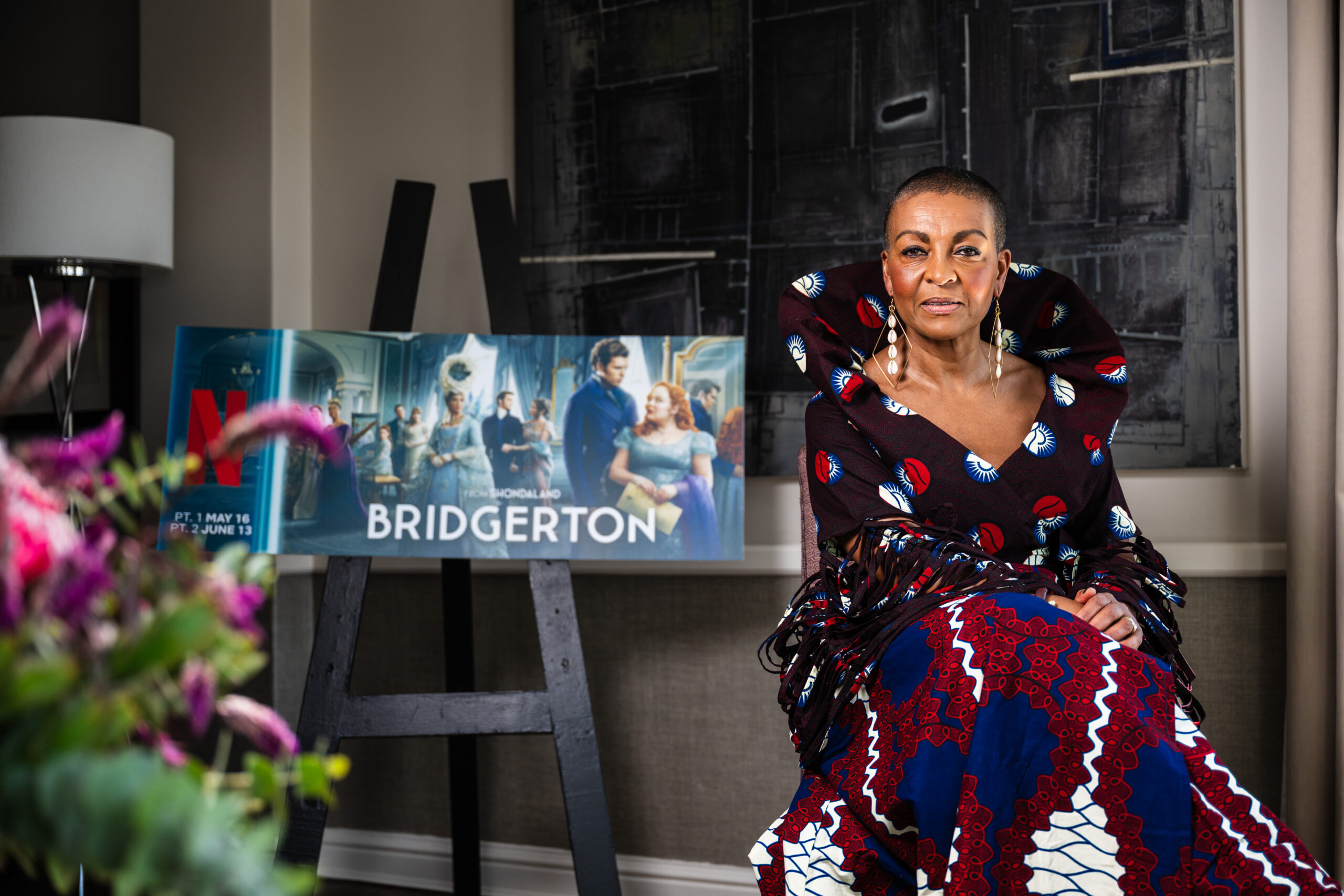
Hi Adjoa, how are you feeling today?
Great, thank you.
Awesome! Let’s talk about the relationship and similarities between Lady Danbury and Penelope Featherington – 2 women defying the odds in their own way
I don’t think you really see much of Penelope and Lady Danbury in the show thus far, but we do know that Lady Danbury has a beady eye on who Whistledown is, and we do know in season 2 that she has a little chat with Penelope about that. We also know that Penelope and Lady Danbury love each other from afar. Well, maybe that’s just me and Nicola Coughlan loving each other from afar. No, Penelope is absolutely Lady Danbury’s love material; she is smart, looked over, and the one the Featherington family assumes is going to stay home and look after her mother in her old age because no one will marry her. So I think Lady Danbury sees this smart, brilliant, overlooked woman, and she recognises a little bit of herself in Penelope. And so to have Penelope get her joy and come into her own in all aspects of her life is something that Lady Danbury is thrilled about.
With this love brewing between Penelope and Colin, Lady Whistledown’s anonymity might be at risk and she could lose it all. Lady Danbury knows one or two things about the fear of losing it all. What advice might she have for Penelope and people who may find the world crumbling at their feet?
Hold your nerve. Hold your nerve! Everything moves on. So something I’ve found during lockdown is nature is a great sustainer. Like, you think the world has gone to hell but the trees still blossom, the birds still sing and the sun rises.
So in your life, hold your nerve. I think it’s desperately sad when people find themselves in such difficult situations that they crumble entirely because life is always renewing and you never know what’s around the corner. What feels like a disaster may just be a different door opening.
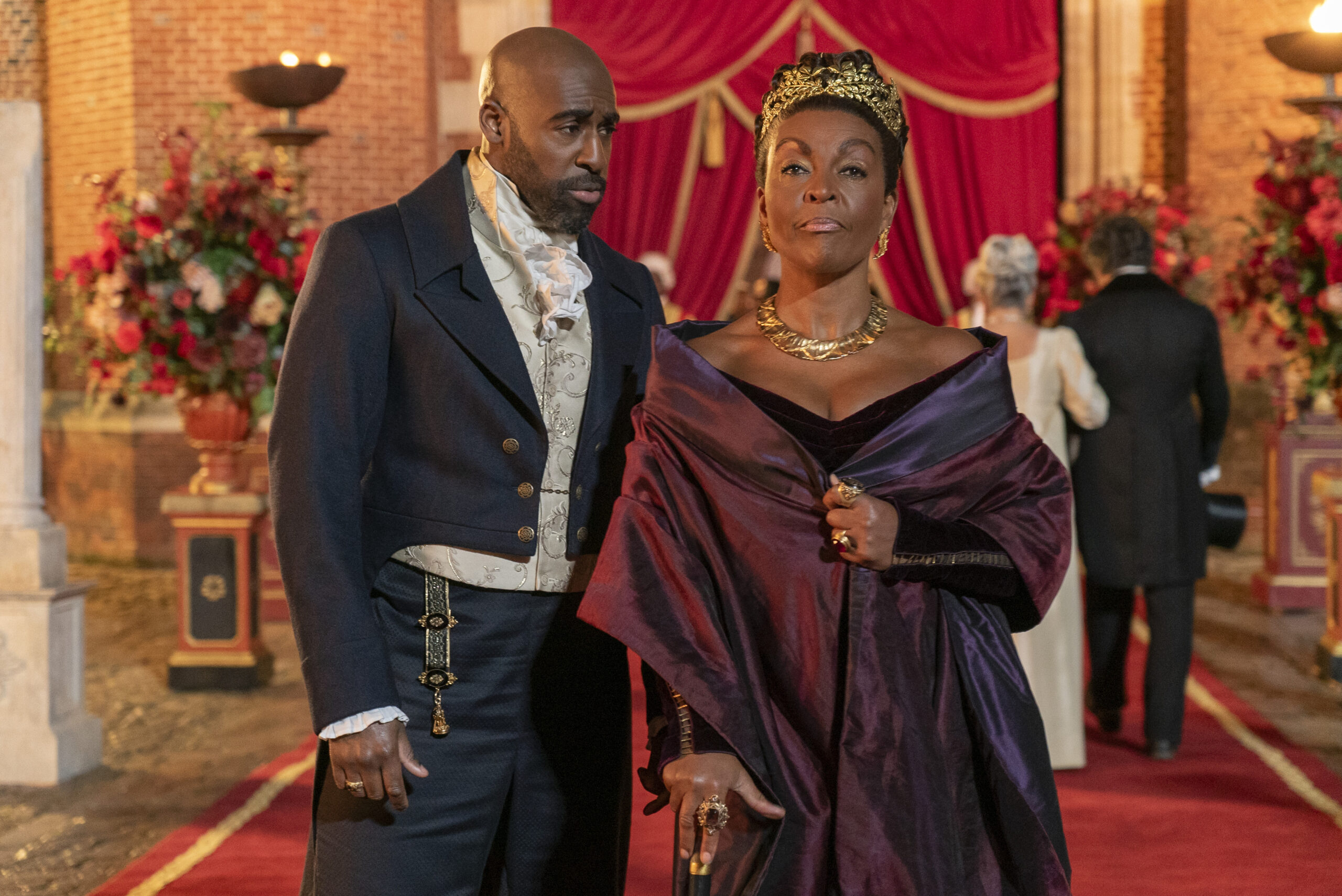
Bridgerton. (L to R) Daniel Francis as Lord Anderson, Adjoa Andoh as Lady Agatha Danbury in episode 304 of Bridgerton. Cr. Liam Daniel/Netflix © 2024
Let’s talk style. The hat, the staff, the way you walk and talk exudes power. How do you shape our perception of Lady Danbury?
I think that in season 1, Lady Danbury talked to Little Simon and said, “When you’re scared, you enter the room and you become the scariest person in the room. That’s how you deal with your fear.” And I think we all do it; you put on your game face when you go out.
You decide, am I going out in my sloppy sweatpants or am I putting my best suit or dress? Am I going out with my hair just anyhow and no makeup? Or am I having to put my face on? We all do it. We all present who we want to be received as, even if we’re not feeling it. And I think Lady Danbury has understood the power of that. So the hat, the swagger stick, the cart of her long coats or whatever she’s wearing, I think there’s an element of that where she’s putting on her game face. And however she is feeling, the game face is on. She understands the power of costume. It’s theatrical, isn’t it?
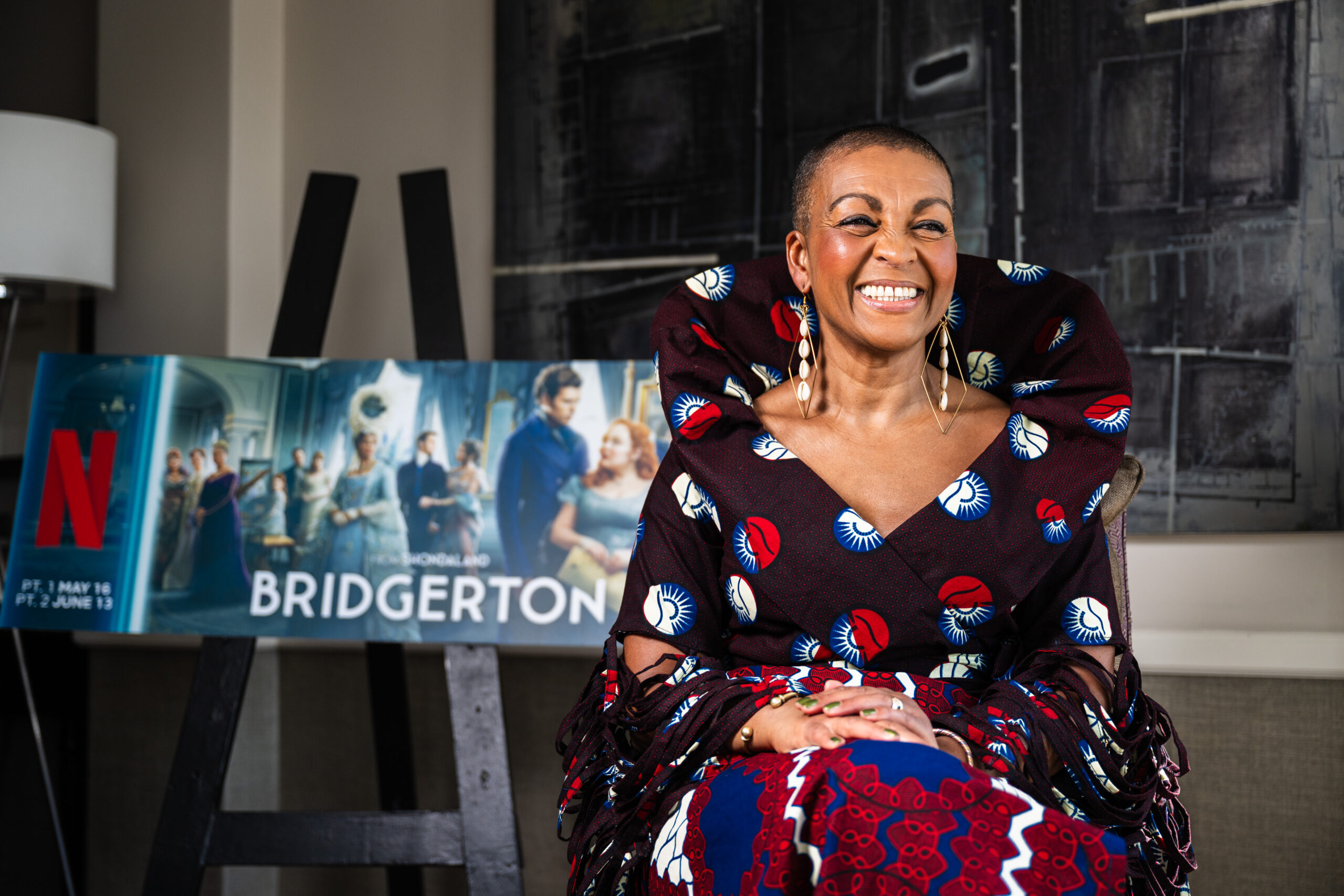
I agree. Lady Danbury’s character is fierce, and certain. You’re also a strong advocate for many forms of human rights. What elements were you excited to bring into Lady Danbury’s character and what part of the character do you relate to the most?
Lady Danbury advocates for people who have less power than they need to have control of their own lives, to have agency in their own lives. She advocates for them. As we’ve seen from the Bridgerton – Queen Charlotte’s story, we know that Lady Danbury experienced that sense of powerlessness in her own life as a young woman. And I believe that all the experiences we have in our lives shape the way we go forward.
As a kid, I was beaten up or bullied or not given the space to fully engage with the world around me as I would have liked to have. And I was a very enthusiastic child. All that frustration, I think, has taken me into worrying about people who don’t have power, who are looked over, who have challenges that they don’t need to have in their lives because of the way that they are seen in society.
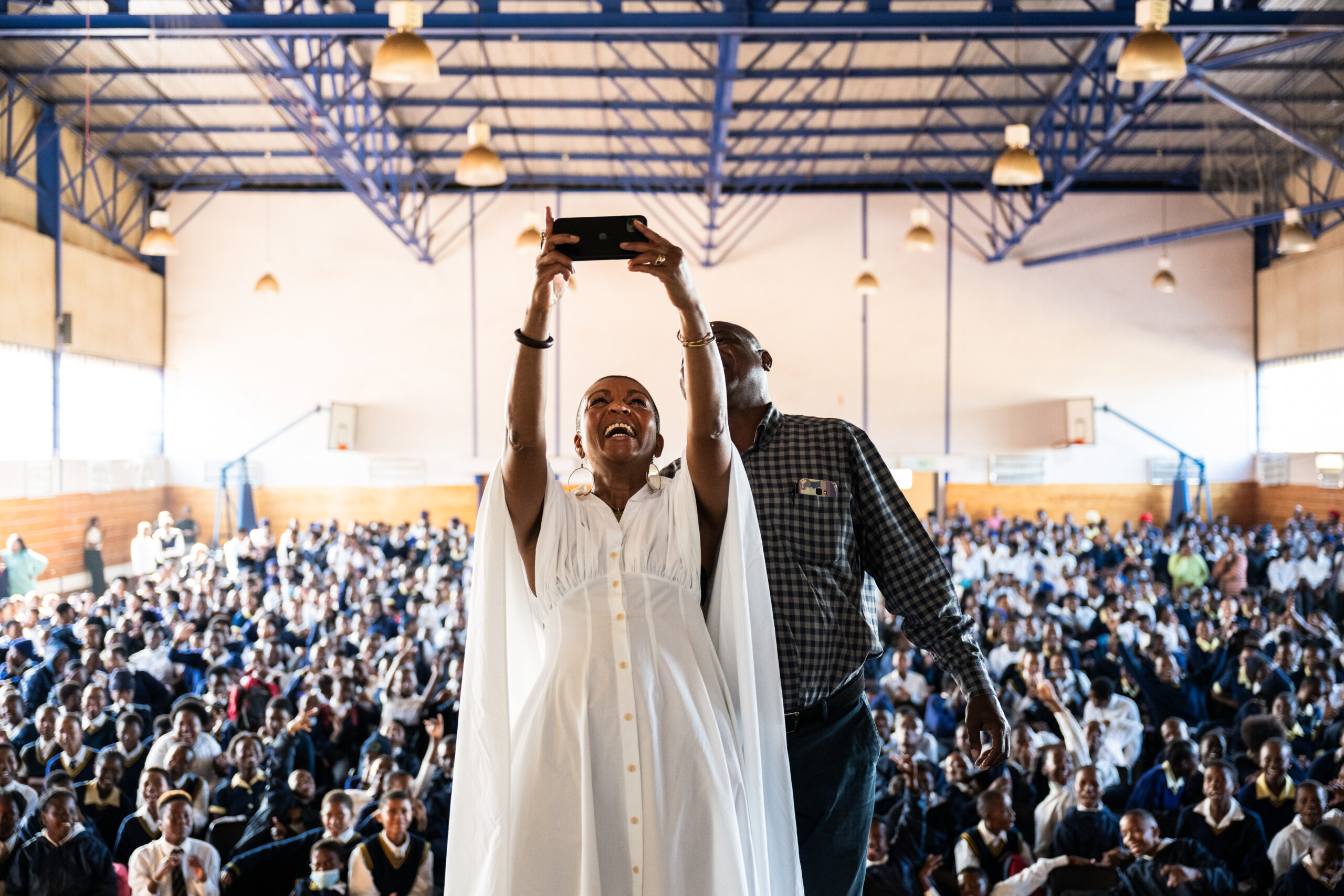
I will advocate for them, always. I’m a patron of the International Rescue Committee which works with refugees across the world. I’m a patron of fair trade that works so that producers, usually in countries that don’t have a lot of global power, get paid a decent wage, that they get to produce pesticide-free food; so they’re not negatively impacted by it. They get to be part of a production chain that pays them an extra premium. So fair trade goods may be a little bit more expensive than their rivals, not much, but a little bit. And that premium goes into empowerment for women, healthcare and education.
I will always advocate for those things. I advocate for tree aid, which is planting trees across the Sahel in Africa to help stop the desert encroaching into arable lands. They’re also working to support farming communities in agroforestry where they replant trees, so the topsoil stays in place. They plant their crops under the trees for shade. Then they market things like sheer nuts into sheer butter that we all buy for our fabulous moisturisers. That income goes back into the community. So I will always advocate for those people because everybody deserves a fair shag in life.
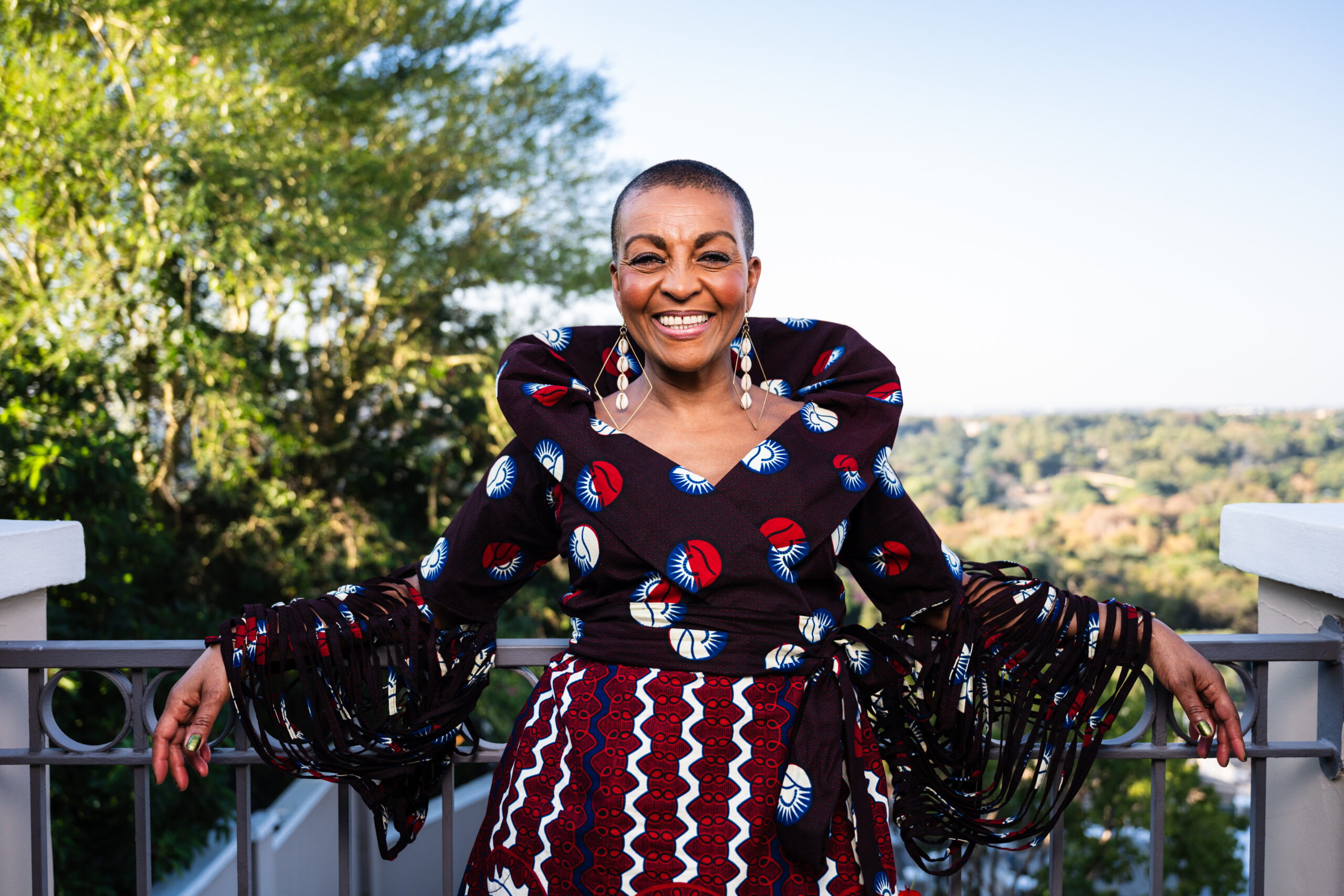
From issues of race to friendship, love and marriage, Bridgerton mirrors our society and sparks conversations about representation and defying expectations. What part of the story or the cast holds the most significance to you in relation today’s world?
I’d say any good story. I’m a fan of drama, of Shakespeare. Any good story has got to have present-day applications or it’s not a good story. And Shonda is the queen of storytelling. So I think the whole show is mirroring the conversations we are having in our lives today. We have better plumbing, generally, we have penicillin and women don’t have to go renting courses; thank the good lord unless they choose to, which is your preference. But I think apart from that, everything is the same. Women still don’t occupy the same status as men.
There was such a wahala about having a diverse cast because knowing the full extent of our history and our continental interaction is not something that we speak about much or something we are taught about much in history. The fact of Queen Charlotte’s African heritage, the fact that there were people at the court of a variety of races and had been forever is not something we’re taught about. We don’t know that Emperor Septimius Severus, the Roman Emperor who built Hadrian’s Wall between Britain and Scotland was from an African Roman Empire background.
But all these things are true. And so it’s about excavating our history and applying it to our present. It’s a cliche, but it’s true that if you don’t know where you come from, you cannot know where you’re going. And so I think all those elements are storytelling. That’s what I love about the show: they embrace this life. Whatever your sexuality, your race, your religion, your gender, or your income bracket, come to this story, you are welcome.
– BellaNaija



